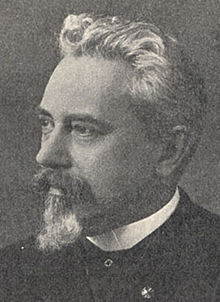Theo de Meester
Theo de Meester | |
|---|---|
 Theo de Meester in 1905 | |
| Prime Minister of the Netherlands | |
| In office 17 August 1905 – 12 February 1908 | |
| Monarch | Wilhelmina |
| Preceded by | Abraham Kuyper |
| Succeeded by | Theo Heemskerk |
| Member of the Council of State | |
| In office 24 April 1917 – 27 December 1919 | |
| Vice President | Wilhelmus Frederik van Leeuwen |
| Leader of the Liberal Union in the House of Representatives | |
| In office 22 September 1913 – 30 March 1917 | |
| Preceded by | Hendrik Goeman Borgesius |
| Succeeded by | |
| Member of the House of Representatives for Den Helder | |
| In office 9 May 1910 – 30 March 1917 | |
| Preceded by | |
| Succeeded by | Pieter Oud |
| Minister of Finance | |
| In office 17 August 1905 – 12 February 1908 | |
| Prime Minister | Himself |
| Preceded by | Jan Harte van Tecklenburg |
| Succeeded by | Maximilien Kolkman |
| Personal details | |
| Born | Theodoor Herman de Meester 16 December 1851 Harderwijk, Netherlands |
| Died | 27 December 1919 (aged 68) The Hague, Netherlands |
| Nationality | Dutch |
| Political party | Liberal Union |
| Spouse(s) | Josina Parker
(m. 1881; |
| Children | 2 sons and 1 daughter |
| Alma mater | Utrecht University (Bachelor of Laws, Master of Laws) |
| Occupation | Politician · Civil servant · Economist · Accountant · Nonprofit director · Editor · Author |
Theodoor Herman "Theo" de Meester (16 December 1851 – 27 December 1919) was a Dutch politician of the defunct Liberal Union (LU) now merged into the People's Party for Freedom and Democracy (VVD) and economist. He served as Prime Minister of the Netherlands from 17 August 1905 until 12 February 1908.
De Meester was the son of Gerrit Abraham de Meester (1817–1864), who had been a member of the House of Representatives for the Zwolle constituency from 1862 to 1864. A former administrator in the Dutch East Indies, De Meester's cabinet was inaugurated on 17 August 1905. It consisted of five Liberal, two Free-minded Democratic, and two non-partisan ministers. It had no majority in either of the two Dutch chambers, and earned the nickname "Porcelain Cabinet". His government first resigned in December 1906, when the defence budget for 1907 was rejected by the Senate. That resignation was refused by Queen Wilhelmina, but the government fell in December 1907, when the Dutch parliament disapproved the defence budget for 1908. The government remained as a demissionary government until 12 February 1908.
References[]
- "Mr. Th.H. de Meester". Parlement.com (in Dutch). Retrieved 25 May 2019.
- 1851 births
- 1919 deaths
- Dutch accountants
- Dutch atheists
- Dutch expatriates in Indonesia
- Dutch magazine editors
- Dutch nonprofit directors
- Dutch nonprofit executives
- Dutch political writers
- Former Calvinist and Reformed Christians
- Liberal Union (Netherlands) politicians
- Members of the Council of State (Netherlands)
- Members of the House of Representatives (Netherlands)
- Ministers of Finance of the Netherlands
- Municipal councillors of The Hague
- People from Den Helder
- People from Harderwijk
- Prime Ministers of the Netherlands
- Utrecht University alumni
- 19th-century Dutch civil servants
- 19th-century Dutch economists
- 19th-century Dutch male writers
- 19th-century Dutch politicians
- 20th-century Dutch civil servants
- 20th-century Dutch economists
- 20th-century Dutch male writers
- 20th-century Dutch politicians
- Treasurers-General
- Dutch politician stubs
